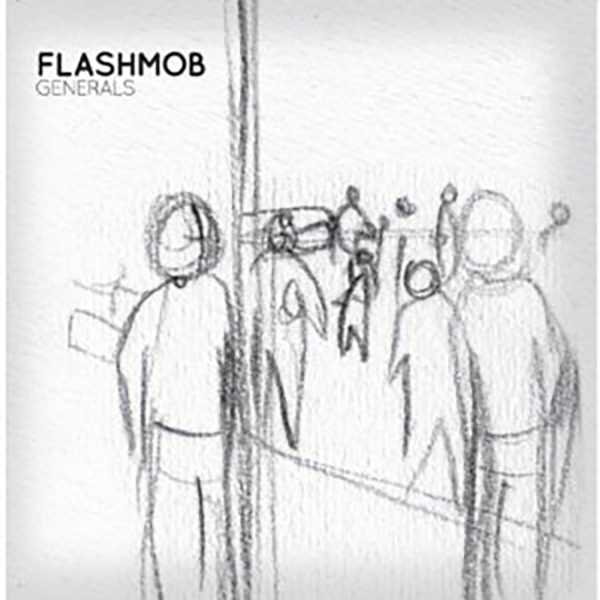
by Ian Mann
October 28, 2011
/ ALBUM
An absorbing album with the emphasis on the overall group sound.
Flashmob
“Generals”
(F-ire Presents F-IRECD 44)
Flashmob is a new quartet led by the Cornish born guitarist Ryan Williams. Their début album appears on the F-ire Presents imprint and features the trumpet and flugelhorn of Fringe Magnetic leader Rory Simmons plus the rhythm section of bassist Will Collier and drummer Nick Smalley. Although the album features Williams’ compositions exclusively he is quick to point out that the group name emphasises the democratic nature of the band, something that can be very clearly heard in the music.
As a teenager Williams was initially influenced by rock acts such as the Red Hot Chili Peppers but later turned to jazz after discovering first John Scofield then Pat Martino and Adam Rogers. Bill Frisell, Pat Metheny and Ben Monder have also been influential on Williams’ style as has Brad Shepik, the guitarist with trumpeter Dave Douglas’ Tiny Bell Trio. Douglas and saxophonist David Binney have also influenced Williams’ writing which endeavours to steer clear of the head/solos/head format in favour of a more integrated group sound that deploys improvised solos as a compositional device.
Much of “Generals” is surprisingly understated for a guitarist led record. Williams’ tunes unfold slowly and logically with the leader very much part of the ensemble. The opening “Chetniks” is a showcase for Simmons’ melancholic, pure toned trumpet sound with Smalley’s carefully orchestrated, low key drum eruptions adding to the drama. Williams himself is an integral part of the ensemble sound and only assumes the lead in the very closing stages of the tune.
Williams presence is more notable on a number of pieces performed in the trio format due to the absence of Simmons who missed one of the recording sessions due to his touring commitments with Jamie Cullum. “A Near Miss” is one such tune and includes a resonant Collier bass solo and Smalley’s delicately detailed percussion alongside Williams’ country-ish Frisell tinged guitar.
For “Blind Faith” the group welcome Simmons back into the fold for a piece based around contemporary drum grooves and short, punchy melodic phrases. There’s a stunning Simmons solo accompanied initially only by Smalley’s drums. Williams later takes the chance to allow his inner rocker to take temporary control. This is one of the album’s most attention grabbing tracks, exhibiting a definite New York sensibility.
“O.A.C” is another trio item with Williams meandering in ruminative fashion around Colliers’ deep bass figures and Smalley’s colourful, finely detailed rhythmic flow, shades here of Jon Christensen or Jeff Williams. Taken as a whole the piece is highly effective.
The quartet piece “Catalogue Of Error” features Simmons’ long, melancholic lines and a carefully paced solo from Williams above Colliers’ rich, deep bass undertow. There’s a fragile beauty here that wouldn’t be out of place on an ECM album.
At first “Borderlines” promises to mine the same kind of territory as “O.A.C” but the trio subsequently gain momentum to push the tune into a more groove orientated area. The interplay between guitar and bass is particularly engrossing with Collier a significant and powerful presence throughout.
“O.A.C” is briefly reprised with Simmons now present in the ranks and taking a leading role. Almost inevitably the tune sounds very different but it is no less effective for that.
The interplay between guitar, bass and drums on the trio pieces is consistently engaging. Williams is prepared to allow his colleagues plenty of space and there are features here for both Collier and Smalley but it’s the three way dialogue that really fascinates.
Simmons returns for the album closer “Top Shelf” another piece with a highly contemporary feel as short repeated staccato phrases demand the listener’s attention. Williams delivers a quietly intelligent solo and there’s a more forceful offering from Simmons that nonetheless retains an underlying lyricism. Smalley also features before the end of another intriguing piece of Williams writing.
“Generals” doesn’t shout for attention and on first playing may even sound a little dull. However persistence on the part of the listener pays dividends. This is highly intelligent music where much of the pleasure is in the detail with Colliers’ powerful but supple bass and Smalley’s colourful drumming becoming more enjoyable with each subsequent listening. Simmons is excellent on all the pieces he plays on, his tone pure and bright and refreshingly free of gimmickry. The same virtues apply to Williams’ always cogent soloing but he is also an intelligent accompanist, an often overlooked aspect of the guitarist’s art.
Williams’ ego-less approach has produced an absorbing album with the emphasis on the overall group sound. Despite the plethora of influences outlined above Williams is very much his own man and has developed an approach to the guitar that transcends his sources. “Generals” is a bit of a grower and it will be interesting to see how these tunes, plus several as yet unrecorded pieces, develop when the band goes on the road in November 2011 as part of a British tour. The tour dates are listed below;
8/11/11 - ParrJazz, Liverpool
9/11/11 - Showroom Cinema, Sheffield.
10/11/11 - Matt and Phreds, Manchester
20/11/11 - The Salisbury, London (Part of the London Jazz Festival)
29/11/11 - Dempsey’s, Cardiff
30/11/11 - One Eyed Cat, Truro
1/12/11 - The Drewe Arms, Drewsteighton
8/12/11 - The Yardbird, Birmingham